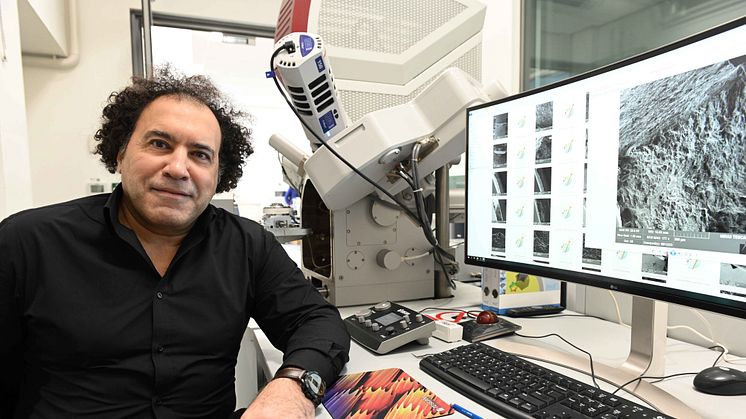
Press release -
Northumbria Professor leads development of ‘wonder material’ for real applications
It’s the strongest material on Earth and has the potential to transform the performance and sustainability of everything from the cars we drive to the way we clean our drinking water.
However, the ‘wonder material’ graphene is still rarely used in everyday life due to the difficulties and expense of manufacturing it commercially.
But that could soon change thanks to a new €9 million EU-funded project in which Northumbria University’s Ahmed Elmarakbi, a Professor of Automotive Composites, is playing a leading role.
The Pioneering Sustainable Graphene-based Solutions for Environmental Challenges project, known as GIANCE, brings together major industry partners such as Stellantis and Boeing, with research and technology organisations and SMEs from across Europe.
Northumbria University’s Professor Elmarakbi has been appointed scientific coordinator for the three-year project, as well as technical board and steering committee chairman.
Discovered in 2004, graphene is made of a single layer of carbon atoms bonded together in a hexagonal, sheetlike structure. It is one million times thinner than human hair and 200 times stronger than steel.
The only way most of us currently encounter graphene is through pencils – with the mineral graphite, which is used in pencil nibs, made up of hundreds of thousands of layers of graphene.
However, the potential of graphene is huge, and the GIANCE project aims to explore ways the material could be used across a wide variety of industries – as composites, coatings, foams and membranes.
Project partners will work together to explore the potential functionalities of graphene, including wear resistance, corrosion resistance, chemical and fire resistance, hardness, impact resistance, high-temperature resistance, structural health monitoring, and ultralow friction surfaces.
They will focus on 11 ‘use cases’ which will examine how graphene could be applied across different sectors, including automotive, aerospace, energy (hydrogen economy), and water treatment.
The GIANCE project is part of the Graphene Flagship – a decade-long Horizon Europe-funded initiative which ran from 2013 until September this year and brought together nearly 170 academic and industrial partners in 21 countries to advance research and development into the use of graphene.
Having previously led the Composites for Automotive task of the Graphene Flagship for four-years, Northumbria’s Professor Elmarakbi will now oversee the development of a prototype graphene-based composite as part of the new GIANCE project.
Speaking about his involvement and what he hopes to achieve, Professor Elmarakbi said: “GIANCE is designed to build on the innovative work of the Graphene Flagship – creating new scalable materials solutions with enhanced technologies.
“By bringing together partners across Europe, GIANCE will create a robust and connected innovation ecosystem by stimulating collaboration, setting-up networks, building credibility for materials development, upscaling technologies, and tackling environmental challenges within the three interlinked project priority sectors – transport, energy, and water.
“Northumbria University’s involvement in this large-scale Horizon Europe project is a significant opportunity and responsibility. It signifies a substantial opportunity to make a meaningful contribution to addressing industry-specific challenges, advancing research, and fostering innovation. It also carries a responsibility to effectively bridge the gap between academia and industry, ultimately benefiting both sectors and society as a whole.”
Professor John Woodward leads Northumbria’s Faculty of Engineering and Environment and said the University’s involvement in GIANCE was testament to its reputation for research in advanced manufacturing technology.
He said: “This is a major European Union-funded project which has the potential to change the way we live, transforming the automotive, aerospace, energy, and water industries, making them more efficient and sustainable.
“As the academic lead in this project, this is an excellent example of how Northumbria University is leading the way when it comes to innovative research in areas which will have a real impact on all our lives.
“Our congratulations go to Professor Elmarakbi who is playing a significant role in the development of graphene related materials. We look forward to the innovations and findings which come out of this project over the coming years, under his supervision.”
This project has received funding from the European Union’s Horizon Europe research and innovation programme under Grant Agreement No 101119286 and UKRI under Grant Agreement No 10090645.
Find out more about the GIANCE project.
Find out more about Northumbria University’s Department of Mechanical and Construction Engineering.

Topics
Categories
UNIVERSITY OF THE YEAR 2022 (Times Higher Education Awards)
Northumbria is a research-intensive university that unlocks potential for all, changing lives regionally, nationally and internationally. Find out more about us at www.northumbria.ac.uk
--- Please contact media.communications@northumbria.ac.uk with any media enquiries or interview requests ---









